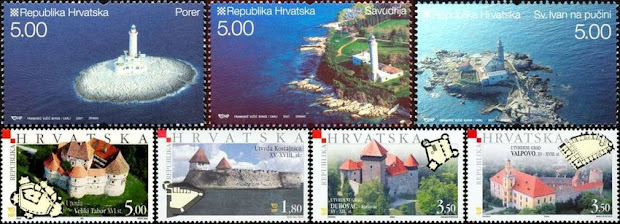Lately I don't have much time to write posts for my blog, but I want to take away the impression that Croatian Crescent is dead. The easiest and fastest thing to do is to refer to other sources with interesting stories, and that's precisely what I am going to do.
Babies first. The Economist writes about alarming demographic trends in several Balkan countries. I have earlier paid some attention (Dutch) to Croatia's declining population, despite the strong position of the Catholic church and despite president Mesić's repeated calls for the return of Croatian Serbs.
 Next birds. The Daily Telegraph ran an interesting article on griffon vultures on the Croatian island of Cres. "Griffon vultures are extinct in many European countries and are endangered in Croatia, but this sanctuary at the picturesque village of Beli has rescued, healed and released 95 birds since it was set up in 1993." Beli is picturesque, I can tell, as I visited it earlier this year.
Next birds. The Daily Telegraph ran an interesting article on griffon vultures on the Croatian island of Cres. "Griffon vultures are extinct in many European countries and are endangered in Croatia, but this sanctuary at the picturesque village of Beli has rescued, healed and released 95 birds since it was set up in 1993." Beli is picturesque, I can tell, as I visited it earlier this year.
 Unfortunately, for some reason the vultures in the sanctuary were stressed out and the people working there (often volunteers) advised me not to approach them, so all I saw was a shadow in the distance.
Unfortunately, for some reason the vultures in the sanctuary were stressed out and the people working there (often volunteers) advised me not to approach them, so all I saw was a shadow in the distance.
 Speaking of birds and babies, Croatia has a huge population of stokes. I took these pictures in Križevci, a pleasant town north-east of Zagreb.
Speaking of birds and babies, Croatia has a huge population of stokes. I took these pictures in Križevci, a pleasant town north-east of Zagreb.
Babies first. The Economist writes about alarming demographic trends in several Balkan countries. I have earlier paid some attention (Dutch) to Croatia's declining population, despite the strong position of the Catholic church and despite president Mesić's repeated calls for the return of Croatian Serbs.
 Next birds. The Daily Telegraph ran an interesting article on griffon vultures on the Croatian island of Cres. "Griffon vultures are extinct in many European countries and are endangered in Croatia, but this sanctuary at the picturesque village of Beli has rescued, healed and released 95 birds since it was set up in 1993." Beli is picturesque, I can tell, as I visited it earlier this year.
Next birds. The Daily Telegraph ran an interesting article on griffon vultures on the Croatian island of Cres. "Griffon vultures are extinct in many European countries and are endangered in Croatia, but this sanctuary at the picturesque village of Beli has rescued, healed and released 95 birds since it was set up in 1993." Beli is picturesque, I can tell, as I visited it earlier this year. Unfortunately, for some reason the vultures in the sanctuary were stressed out and the people working there (often volunteers) advised me not to approach them, so all I saw was a shadow in the distance.
Unfortunately, for some reason the vultures in the sanctuary were stressed out and the people working there (often volunteers) advised me not to approach them, so all I saw was a shadow in the distance. Speaking of birds and babies, Croatia has a huge population of stokes. I took these pictures in Križevci, a pleasant town north-east of Zagreb.
Speaking of birds and babies, Croatia has a huge population of stokes. I took these pictures in Križevci, a pleasant town north-east of Zagreb.





